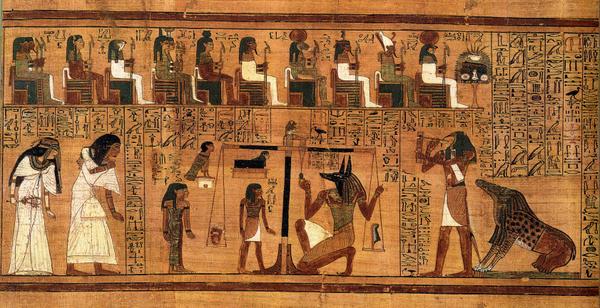The Ancient Egyptians are a mainstay of primary school topics, with the gruesome rituals of mummification and the colourful cast of gods such as the jackal-headed Anubis, who famously weighs the heart of the deceased against a feather to see if it is free from sin.
r
r
In a previous issue, Tom shared an enquiry that used the Egyptian afterlife as a route into discussing boredom and infinity. Recently, I’ve been using the idea of “The Book of the Dead”. These were lists of “negative confessions” – not, as with a Christian confession, of what you have done (or believe), but of what you have not done. An Ancient Egyptian anticipated having to truthfully make these confessions to enter the afterlife –
r
Here is the beginning of one such list (of 42!), from the Papryus of Ani. As with all the resources I send out, please read them in advance and decide if they’re appropriate for your class. Number 11 is adultery, so you might want to stop at ten to avoid awkward eXemplifications!
- I have not committed sin.
- I have not committed robbery with violence.
- I have not stolen.
- I have not slain men and women.
- I have not stolen grain.
- I have not purloined offerings.
- I have not stolen the property of the gods.
- I have not uttered lies.
- I have not carried away food.
- I have not uttered curses.
Some of the others are very demanding, such as, “I have never raised my voice (spoken arrogantly, or in anger).”
r
The Enquiry Plan
r
By way of a warm-up and to set a context, after a refresh of the funerary practices of being buried with the essentials for the afterlife, I ask them to imagine that the beliefs of the Ancient Egyptians have persisted to the present day. In pairs, they discuss what they as a “Modern Ancient Egyptian” would want to take with them into the next life.
r
Then, sticking with the conceit that those ancient beliefs have persisted, I introduce them to the notion of the Book of the Dead, and ask them what rules of this “I have not…” form they think would/should be included in a modern update. They work on this in groups. Then we hear some of the rules, and that’s where some very precise critical thinking starts.
r
Counterexamples and Refinements
r
Say the rule is, “I have not hurt anybody”. Ask if there are any exceptions. Then see if there are exceptions to those exceptions, and so on, refining the rule as you go along. They can end up being quite elaborate, for example to include the administering of vaccines:
r
“Never hurt anybody unless it is for self-defence;
or to defend your family or you country;
or it is an organised sport and you are playing by the rules;
or you are a doctor or nurse and you are doing it to stop something worse happening.”
r
You don’t want to end up leading the session too much, so once you have facilitated the process of a rule being tested by eliciting counterexamples and refinements, get them to do it for themselves on some of their other rules.
r
It’s a good way of exploring logical relations, examples and counterexamples, generalisations and so on. One of those themes that can easily sustain two sessions if you are to get the most out of it, as different rules will raise different concepts. It’s particularly interesting, after exploring particular rules, to look at rules in general. Can a list of commands of what not to do be enough to tell someone how to be a good person? What about a list that was only of positive commands?
r
Best wishes,
r
Jason
